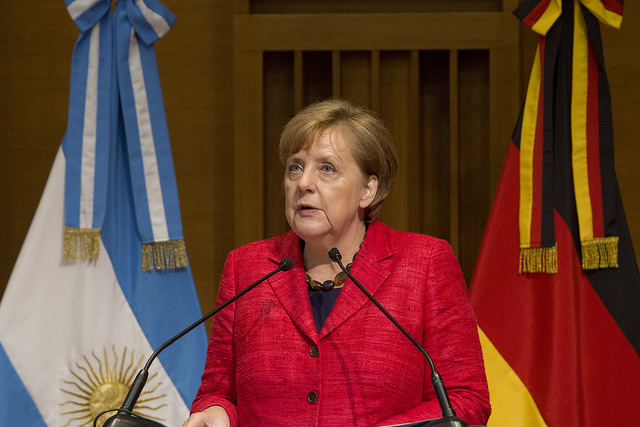
Germany gets far more grief than it should for under-performing in Afghanistan. Italy, Hungary, Turkey and others had as or more restrictive caveats. Greece sent the most token of forces. The US was entirely distracted by Iraq for many years, and then kept rotating commanders of ISAF as if they were tires (sorry, time to change to winter tires up in Canada). The British troops kept getting in way over their heads. The Canadians and the Dutch pulled out of combat before everyone else — so much for “in together, out together.”
However, it takes a lot of chutzpah for Germany to propose reforms to NATO. Given that Germany opted entirely out of the last NATO operation in the waters near and the skies over Libya, perhaps German officials should keep their hands down for now. Their idea? That NATO will divide into clusters centered around one of the larger powers. Who would that be? Given past patterns, such as the Balkans where the five biggest contributors — the QUINT — shaped policy for the rest, the clusters would be centered around the US, UK, France, Italy and Germany.
Who would want to be in the German cluster? How about those countries that do not plan on showing up or show up with restrictive rules on what they can do? Of course, it could be worse — one could be in the Italian cluster, where indecision and unpredictability is the piatto del giorno.
There is something to this. Friends and I are in the middle of writing a piece about NATO’s Smart Defense effort, whereby countries try to coordinate their procurement so that there is less overlap/duplication and more interdependence and specialization. We are skeptics about the success of Smart Defense, but if there is going to be such specialization, it probably should be by those sharing language political systems. According to the forthcoming Dave and Steve book, countries that share similar domestic political institutions should plan together since they are likely to be similarly restricted or unrestricted down the road: US and France; UK and Canada; Germans, Italians, Hungarians, and Dutch.
Still, after a decade of Germans largely disappointing the rest of the alliance (we had higher expectations about the Germany military than the Italian or the Spanish or the Hungarian), perhaps the German foreign minister should keep his seat and let those who bore more of the burdens dominate the conversation. Even if the Germans were right, their political capital in NATO is pretty close to zero. If this were the EU, then, sure, yak away.
This post first appeared on the author’s blog.








4 comments
I worked at Ramstein under NATO and USAFE. It is at the very least confounding with regards to the Germans. I knew even back then they tried to soft sell the Nazi movement and some of that I understand. At the same time and it is a youth-driven society, it is mind boggling that they do this,
I am not well-informed about the whole situation of the German state, but I can guess that they are heavily dependent on present arrangements for their high standard of living and their security. That means Germany is dependent on the United States, which set up those arrangements and had a substantial part in maintaining them over the years. Therefore, Germany will remain a satellite of the U.S., along with most of the rest of Europe, and NATO will remain a feature of the American imperium. Everyone in power must be aware of this, so the purpose of pretending to move some sort of reform of NATO must be purely theater, and the question is why the German leadership thinks this particular form of theatrics is desirable. The performance of Germany in such adventures as Afghanistan, Iraq, Libya, and possibly Syria seems irrelevant; they aren’t needed.
Except that nations that benefit from the American military have been known to take positions very different than the American position*, and that’s not even taking France into consideration. The ability to provide protection can be useful, but I think people in America and abroad overestimate how much it’s worth.
*For example the U.K. and the E.U. The U.S. would like to see the E.U. grow far more powerful than it currently is, the U.K. is debating whether or not to even stay in it.
I am not sure you can draw a clear link between US dominance of NATO and Germany’s current security. In the absence of high US defense spending NATO allies would certainly devote greater resources to defense, but in the case of German I doubt it would be significantly greater, and not enough to meaningfully impact German standards of living. The German proposal may be theatrics because it will never go anywhere, but I think the German desire for more influence on NATOs direction in genuine.